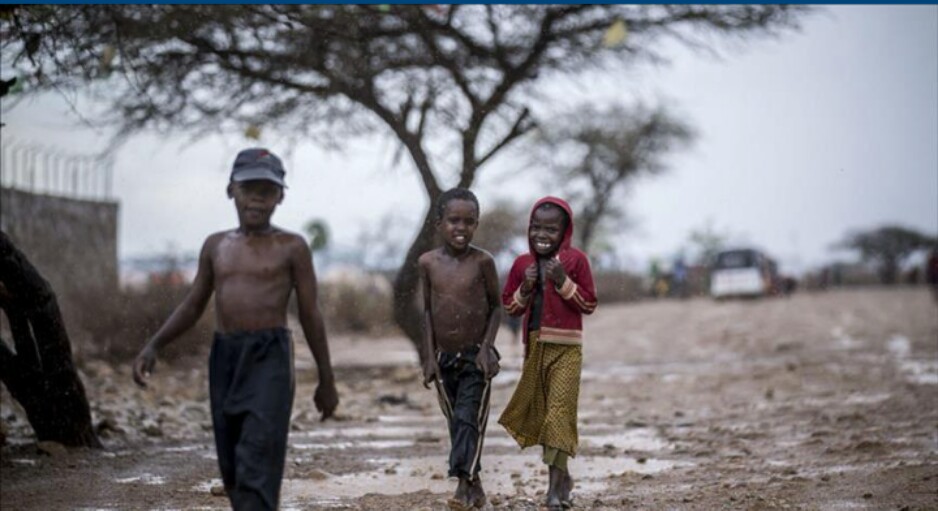Njombe, MINA – Despite multiple awareness campaigns, children in Tanzania’s southern highlands are still suffering from alarmingly high rates of malnutrition due to poor diets that do not nurture cognitive and physical development, local experts warned.
“Njombe, one of the East African nation’s “bread basket” regions known for its delicious avocados, is afflicted by acute malnutrition, with nearly half of the children there under the age of five suffering from stunted development,” officials said as quoted by Anadolu Agency reports.
Bertha Nyigu, a regional nutritional officer in Njombe, said poor nutrition in the region has increased children’s vulnerability to health problems, including poor brain development, low immunity, and increased susceptibility to infection.
“Most parents don’t give their children good food. They mostly feed them porridge and maize meal, even though there are plenty of fruits and vegetables around,” she told Anadolu Agency.
Also Read: UN Warns of Rapidly Worsening Humanitarian Crisis as Over 100,000 Flee Violence in Sudan
Robbed of vital nutrients, the hapless children grow up stunted and sickly, Nyigu said, adding that some develop mental conditions, unable to grasp teachers’ lessons in class.
Malnutrition, which mostly affects women of reproductive age and underage children, is triggered by insufficient nutrients in foods. The metabolic disorder is responsible for the deaths of five million children globally every year.
While Tanzania’s economy is steadily growing, the majority of its people are still trapped in the quagmire of poverty, and malnutrition is still rife. Over 34 percent of children under the age of five are stunted, and nearly 45 percent of women of reproductive age are anemic, according to government statistics.
Effective strategies
Also Read: Trump, Mamdani Aim for Cooperative Relationship After White House Meeting
Though Tanzania has made some progress towards reducing stunted growth and the number of young underweight children, the situation in Njombe is still dire.
President Samia Suluhu Hassan, who recently toured Njombe, urged regional leaders to adopt effective strategies to end the disturbing problem.
Under the country’s national nutrition strategy, the government is determined to increase focus on improving nutrition, especially in rural areas, to reach vulnerable groups, including children below the age of five and pregnant women through effective policies, programs, and good use of resources.
Poverty, food insecurity, and malnutrition are salient features of life in rural Tanzania, where people do not earn sufficient incomes to provide their families with a diverse diet, local experts said.
Also Read: 1,700 Sudanese Children Suffering From Malnutrition in Tawila Camp, Local Group Warns
Analice Kamala, director of food science at the Tanzania Food and Nutrition Centre, said the majority of people in rural areas were not sufficiently educated to understand the dangers of poor diets for children.
“Efforts to improve nutrition must start at home. Family members should help other members of the community to change their attitude toward eating certain foods,” she said.
Kamala called on regional leaders to help local people improve food processing techniques, such as fortifying flour with micronutrients like iron and vitamin A.
Effects on learning
Also Read: Finland’s Largest Retailer Halts Israeli Product Sales
In the dusty village of Mlangali, located 45 kilometers (28 miles) from Njombe, concerned teachers say many of the 611 children at the local primary school are perform at below-average levels.
“They fall asleep all the time … and they hardly grasp what you teach them,” said Irene Songolo, a third grade teacher at the school.
Though virtually all nutritional deficiencies that afflict children in Njombe can be easily and cheaply prevented through salt iodization, fortification of flour, and doses of vitamins, local residents are increasingly worried that their children’s futures might be hobbled by mental disabilities.
Local people in Mlangali, often poorly educated, do not see the nutritional benefits of fruits and vegetables grown in the village.
Also Read: 1,000th Western Military Supply Plane Lands in Israel Since Gaza War
“We don’t have a food program at school, so children often go hungry for many hours. And when they go back home, the only food is maize meal,” said Songolo.
Child health advocates are still working to conclusively prove the link between better nutrition and academic performance, with recent studies showing that a poor diet could affect a child’s thinking skills, health, and even behavior.
A better meal, particularly at breakfast, can affect mental capacity of school-aged children, enhancing their psycho-social wellbeing, reducing aggression, and enhancing their personal discipline, according to researchers.
Lydia Meshack, a 31-year-old resident of Mlangali, often feeds her three children maize meal, with her one-year-old daughter, Angela, is suffering from severe malnutrition. There are no proper health facilities to treat Angela where they live, so the mother and daughter have to travel over 30 kilometers (18.6 miles) on foot to reach the nearest clinic.
Also Read: Trump to Meet with NYC Mayor-Elect Mamdani at White House on Friday
“My daughter started to lose weight and she lost her appetite. Her skin became shockingly pale. She could barely swallow any food,” said Meshack.
Although fighting malnutrition seems an uphill struggle for the government, local residents in Njombe hope there is a glimmer of light at the end of the tunnel, with officials jostling to resolve the menacing problem. (T/RE1)
Mi’raj News Agency (MINA)
Also Read: Syria, Jordan Condemn Netanyahu’s Visit to Occupied Syrian Buffer Zone
































 Mina Indonesia
Mina Indonesia Mina Arabic
Mina Arabic